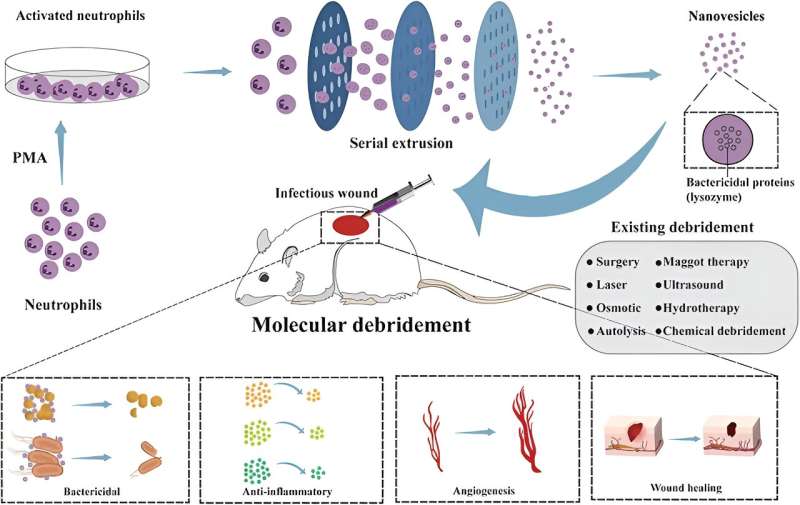This article has been reviewed according to Science X's editorial process and policies. Editors have highlighted the following attributes while ensuring the content's credibility:
fact-checked
proofread
Engineered nanovesicles from activated neutrophils show promise in treating infected wounds

Infectious wounds represent a critical challenge in health care, especially for diabetic patients grappling with ineffective antibiotics and escalating drug resistance. Conventional therapies often inadequately address deep tissue infections, highlighting the need for more innovative solutions.
Engineered nanovesicles (NVs) from activated neutrophils provide a precise mechanism to combat pathogens deeply embedded in tissues, potentially revolutionizing the management of complex infectious wounds and boosting overall treatment efficacy.
Researchers at the Research Center for Neutrophil Engineering Technology have achieved a significant advancement in medical nanotechnology. Their findings, published in Burns & Trauma on June 20, 2024, detail the creation of novel neutrophil-engineered NVs.
These NVs, rich in bactericidal proteins, are set to transform infectious wound treatment by amplifying the body's natural immune response at the injury site.
This study reveals that engineered NVs derived from activated neutrophils not only mimic the physical properties of exosomes but surpass them due to their rich content of bactericidal proteins. Extensively tested both in vitro and in vivo, these NVs effectively combat key pathogens such as Staphylococcus aureus and Escherichia coli, which contribute to deep tissue infections.
The NVs promote rapid debridement, significantly reduce bacterial populations, and boost collagen deposition, thus hastening the healing process. This research positions NVs as a formidable alternative to traditional antibiotics, introducing a novel method for treating resistant infections and advancing the field of wound care.
Dr. Bingwei Sun, the study's senior researcher, emphasized, "These engineered NVs mark a major advancement in the management of infectious diseases. By targeting the infection site with high levels of bactericidal proteins, we achieve swift and effective healing, thereby opening new paths for the treatment of chronic and resistant infections."
The advent of activated neutrophil-derived NVs signifies a major leap in medical technology, potentially reducing health care costs and enhancing patient outcomes. This innovation not only promises to improve wound healing in diabetic and other chronic infection patients but also sets the stage for further development of biologically inspired therapeutic strategies.
More information: Hangfei Jin et al, Engineered nanovesicles from activated neutrophils with enriched bactericidal proteins have molecular debridement ability and promote infectious wound healing, Burns & Trauma (2024). DOI: 10.1093/burnst/tkae018
Provided by TranSpread





















